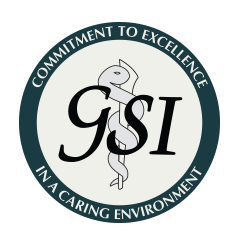Colonoscopy
The most commonly performed GI procedure, a colonoscopy is used to help detect colon cancer, digestive problems, and other diseases. Although colon cancer is one of the most preventive cancers, it is still the second leading cause of cancer deaths in the United States. This is in part because many people avoid screening colonoscopies due to perceived discomfort and embarrassment. Colonoscopy is recommended if you are 50 years of age or older, have a family history of colon cancer or polyps, or have experienced any changes in bowel habits, rectal bleeding, or other GI complaints.
GSI offers a pain-free, minimally invasive colonoscopy performed at our facility.
After completing the necessary procedure preparations, you will be placed on your left side on the examining table. An IV will be started and intravenous sedation will be given. A flexible lighted tube (colonoscope) will be inserted into the rectum to conduct the examination. A small piece of tissue may be removed for examination under the microscope (biopsy). Growths (polyps) found in the intestinal tract may be removed. Systematic removal of polyps can reduce the risk of developing colon cancer by 90%.
To learn more about colonoscopy, see colonoscopy on our Patient Resources page.
American Cancer Society Updates Colorectal Cancer Screening Guideline
- People at average risk of colorectal cancer should start regular screening at age 45.
- People who are in good health and with a life expectancy of more than 10 years should continue regular colorectal cancer screening through the age of 75.
- People ages 76 through 85 should make a decision with their medical provider about whether to be screened, based on their own personal preferences, life expectancy, overall health, and prior screening history.
- People over 85 should no longer get colorectal cancer screening.
Ask the Doctors: Colonoscopies still best method for detecting colon cancers
“I know that colonoscopies are more thorough than the at-home DNA stool test for colon cancer. But how much better?”
The 20 states with the best and worst colorectal cancer screening rates.
The Centers for Disease Control and Prevention states, “Screening tests help find precancerous polyps (abnormal growths) so they can be removed before they have a chance to turn into cancer. This prevents colorectal cancer. Screening also can find this cancer early, when treatment is most effective. However, about one-third of adults aged 50 or older (about 22 million people)—the age group at greatest risk of developing colorectal cancer—have not been screened as recommended.”


